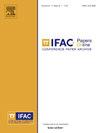Hybrid Modeling of the Insulin-Glucose System: Combining Linear and Data-Driven Models for Artificial Pancreas
Q3 Engineering
引用次数: 0
Abstract
Type 1 diabetes mellitus is a chronic condition that requires insulin delivery to maintain blood glucose levels within a desired range. The artificial pancreas (AP), which integrates a continuous glucose sensor, an insulin pump, and a control algorithm, is a promising solution for automating insulin delivery. Designing optimal controllers for the AP is crucial to its effectiveness. Existing approaches often rely on advanced controllers based on models of the insulin-glucose system. However, this system is highly complex, nonlinear, and subject to time-varying dynamics and inter-patient variability, which pose significant challenges for model accuracy and control design. Hence, data-driven and machine learning-based models are emerging as powerful alternatives. This paper presents a novel data-driven modeling approach that combines two components: a linear model and a machine learning-based model. This latter is computed with the CHoKI learning method, to capture the nonlinear deviations of the actual system from the linear model, enabling the combined model to better represent the insulin-glucose system. This hybrid modeling approach offers improved prediction accuracy compared to previously proposed models in the literature. The improved model accuracy can lead to better controllers for the AP. The proposed approach is validated using the virtual patients of the FDA-accepted UVA/Padova simulator. The results outperform state-of-the-art models in prediction errors, demonstrating its potential as a step forward in AP control system design.
胰岛素-葡萄糖系统的混合建模:结合人工胰腺的线性和数据驱动模型
1型糖尿病是一种慢性疾病,需要胰岛素输送来维持血糖水平在理想范围内。人工胰腺(AP)集成了连续血糖传感器、胰岛素泵和控制算法,是自动化胰岛素输送的一个很有前途的解决方案。设计最优的AP控制器对其有效性至关重要。现有的方法通常依赖于基于胰岛素-葡萄糖系统模型的高级控制器。然而,该系统高度复杂、非线性,且受时变动力学和患者间可变性的影响,这对模型精度和控制设计提出了重大挑战。因此,数据驱动和基于机器学习的模型正在成为强大的替代方案。本文提出了一种新的数据驱动建模方法,该方法结合了两个组成部分:线性模型和基于机器学习的模型。后者使用CHoKI学习方法计算,以捕获实际系统与线性模型的非线性偏差,使组合模型能够更好地表示胰岛素-葡萄糖系统。与文献中先前提出的模型相比,这种混合建模方法提供了更高的预测精度。改进的模型精度可以为AP提供更好的控制器。使用fda认可的UVA/Padova模拟器的虚拟患者验证了所提出的方法。结果在预测误差方面优于最先进的模型,表明其在AP控制系统设计中向前迈进了一步。
本文章由计算机程序翻译,如有差异,请以英文原文为准。
求助全文
约1分钟内获得全文
求助全文
来源期刊

IFAC-PapersOnLine
Engineering-Control and Systems Engineering
CiteScore
1.70
自引率
0.00%
发文量
1122
期刊介绍:
All papers from IFAC meetings are published, in partnership with Elsevier, the IFAC Publisher, in theIFAC-PapersOnLine proceedings series hosted at the ScienceDirect web service. This series includes papers previously published in the IFAC website.The main features of the IFAC-PapersOnLine series are: -Online archive including papers from IFAC Symposia, Congresses, Conferences, and most Workshops. -All papers accepted at the meeting are published in PDF format - searchable and citable. -All papers published on the web site can be cited using the IFAC PapersOnLine ISSN and the individual paper DOI (Digital Object Identifier). The site is Open Access in nature - no charge is made to individuals for reading or downloading. Copyright of all papers belongs to IFAC and must be referenced if derivative journal papers are produced from the conference papers. All papers published in IFAC-PapersOnLine have undergone a peer review selection process according to the IFAC rules.
 求助内容:
求助内容: 应助结果提醒方式:
应助结果提醒方式:


